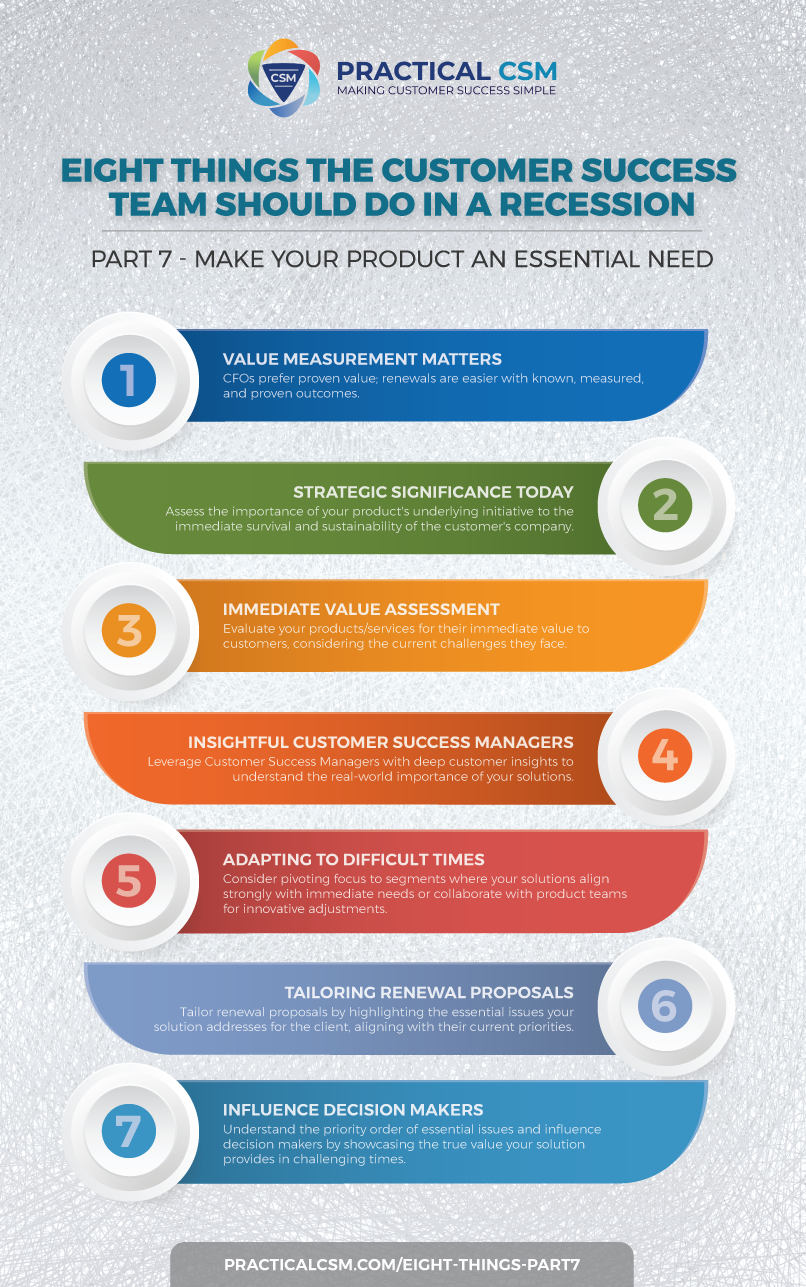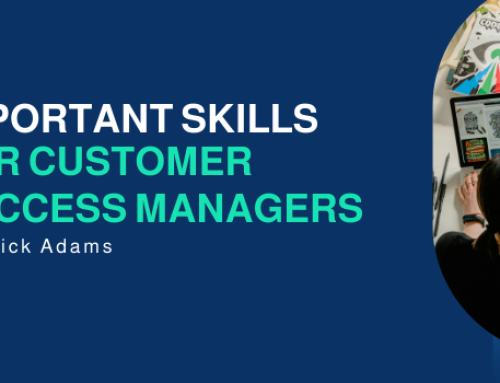Make Your Product an Essential Need
Eight Things the Customer Success Team Should Do in a Recession – Part 7
Overview
There were a lot of great points made in my recent interview with Nick Mehta, CEO of Gainsight, but there was one aspect of the interview in particular that I think was particularly important. This was the part of our conversation when we discussed the role of the Customer Success Management team during a recession, or during any period of uncertainty where businesses are tightening up budgets and only performing essential activities due to fear of an impending recession, which I think is a good description for the situation we find ourselves in right now.
This article is partially based upon my recent discussion with Nick Mehta, and describes eight practical steps that almost any Customer Success Management team should be able to take when faced with a recession or period of uncertainty. In fact, to be exactly accurate we will discuss seven things to do and one thing to avoid doing. The original interview that inspired this article was recorded and the recording is available from our website here and from our YouTube channel here.
The eight practical steps we will be covering in this article are:
- Proactively Offer Your Help
- Address Your Client’s Current Priorities
- Measure and Prove the Value
- Use Process to Create Efficiency
- Automate Customer Success Management
- Leverage the Power of Client Communities
- Make Your Product an Essential Need
- Do Not Become the Concierge

Make Your Product an Essential Need
This was something that Nick Mehta came out with during our recent live Thought Leadership webinar on the topic of “Why Customer Success is Even More Important in a Recession”. I thought Nick was spot on (as ever) in his observation. Not every business fairs poorly in a recession, indeed some business can actually perform better in recessions than in normal times. But unless you run a liquor store or provide debt counselling, the chances are that your business will be negatively impacted by a recession, or even by the fear of an impending recession – what Nick described in the webinar as a period of uncertainty which I think is a very apposite description for the times we are living right now from the latter half of 2022 up to this present moment in April 2023 as I write this article.
Of course the reason why your business will be impacted is because your customers’ businesses will be affected. And that impact is generally seen as a decline in sales revenues, and particularly in net new sales (new orders from new customers). We kind of covered this angle when we were looking at Part 3 (Measure and Prove the Value). What we said in that section was that it is far easier for a CFO or other business decision maker to say “yes” to a contract renewal if the value is already known, measured and proven. Far harder therefore to get a brand new and highly innovative initiative approved by the funding committee, because it carries much greater risk levels, which in a time of already-heightened risk is generally something that business decision makers will be looking to avoid if at all possible.
What is equally important to business decision makers is the relative importance of the underlying initiative that your product or service supports. If this underlying initiative is critical to the ongoing success or even the very sustainability of the company then you will stand a lot higher chance of getting your renewal approved than if your product supports a completely unessential initiative that for example might return a lot of value in five years’ time but does little for the bottom line of your customer’s business right now.
Well, shouldn’t CEOs and CFOs and their like be looking ahead five years or more, and welcoming with open arms projects that look like they will be of great strategic significance in 5 years time? On paper yes they should. But in practice right now, the CEO, CFO and others may well be much more concerned about more pressing issues, such as survival this year. From the customer’s stakeholders’ perspectives, growth in 5 years might seem like a luxury right now to those who are fighting for their survival. As such, more then ever before you need to examine your products and services in the light of what those solutions can do for your customers right now that might be valuable to them.
To do this will of course necessitate a reasonably profound and broad/deep understanding of your customers’ businesses and their current challenges and problems. This is where the Customer Success Manager who has befriended multiple stakeholders and built trust relationships with them can really come into their own. They are the ones who are going to have the insight into our customers’ realities that enable us to look through our customers eyes at our solutions to really understand the cold hard truth about just how important our company’s solution is to our customer. So even if on paper the math adds up and in “normal times” it might make a lot of sense in “normal times” to continue funding the initiative the customer has that in turn utilizes our solution. But right now it can often seem easier to for example put a blanket hold on all non-essential purchases until easier time re-emerge.
Can you honestly say “yes” to both these questions about your customer’s initiative?
QUESTION 1: Does your solution help them create a decent level of value?
QUESTION 2: Is this value something that is really essential right now?
So what do you do if you ask yourself the above questions and find that one or more of your answers is not entirely as strong as you would desire it to be? One potentially legitimate answer to that question might be to give up on that segments for now and instead focus your energy and resources on other market segments where you can say “Yes” to both questions. Another approach would be to work with your product team (and maybe even with some of your most friendly customers) to see if you find innovative new ways to make your solution more valuable to your customers in these difficult times.
Can this be done? Absolutely it can be done!
For instance, my company sells training, and training is a service that generally fairs badly in difficult times, because it is mostly seen as a non-essential cost to the business, rather than as an enabler of value. You have to keep the lights on and the aircon or heating working. Likewise you have to pay your employees’ salaries and you also have to pay the government its taxes as they fall due, but do you absolutely have to purchase that training program right now, or could it wait six to twelve months do you think?
So what can your company do about that, whilst in discussion with clients about upcoming renewals? Well of course we can discuss all the general benefits of our product, but perhaps it might be better to drill down on the essential issues that our research has shown us this company is facing and which these solutions would appear to match. In finding these “matches” to essential issues, we are uncovering more of the true value that our solution will (or at least could) be generating for our clients. What is more, we are also learning about the priority order of these essential issues, and relationships between these issues and the various different stakeholders that we have occasion to meet and whose thought processes we want to influence.
In this way, we can tailor our renewal proposals, our success plans and our roadmaps to meet the needs not just of the client’s company as a whole, but also of the decision makers that are present at the meeting we are currently attending.
Stay tuned for Part Eight of the “Eight Things the Customer Success Team Should Do in a Recession” article which will be published next month.
Go Back to “Eight Things the Customer Success Team Should Do in a Recession – Part One.”
Go Back to “Eight Things the Customer Success Team Should Do in a Recession – Part Two.”
Go Back to “Eight Things the Customer Success Team Should Do in a Recession – Part Three.”
Go Back to “Eight Things the Customer Success Team Should Do in a Recession – Part Four.”
Go Back to “Eight Things the Customer Success Team Should Do in a Recession – Part Five.”
Go Back to “Eight Things the Customer Success Team Should Do in a Recession – Part Six.”






Leave A Comment
You must be logged in to post a comment.